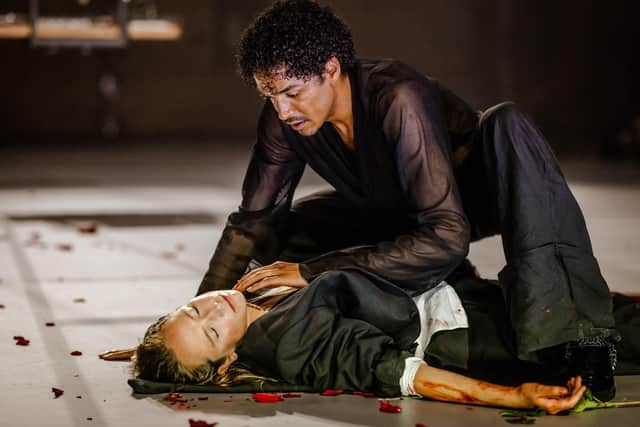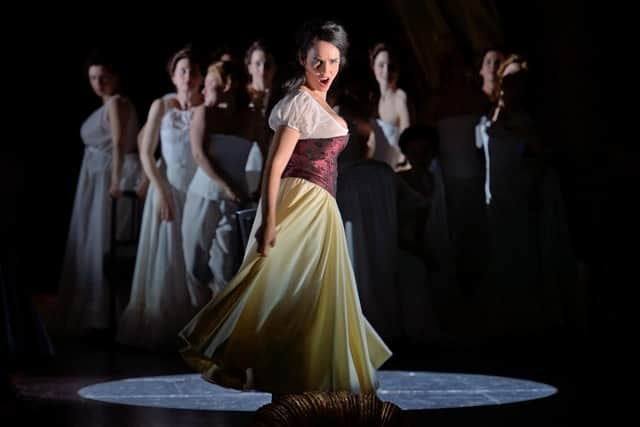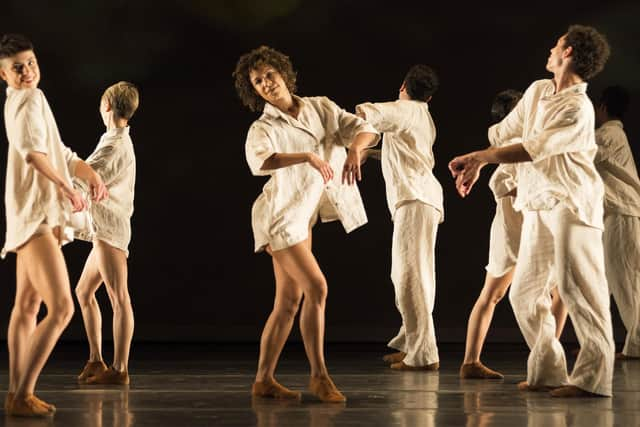Edinburgh International Festival: Scotsman critics assess 2024 programme - theatre, classical music, dance, contemporary and traditional music
Theatre – Joyce McMillan
With Nicola Benedetti in charge of the Edinburgh International Festival (EIF), it’s perhaps inevitable that theatre almost literally plays second fiddle to a massive music programme this year – and does not feature on the festival’s biggest stages.
The seven theatre shows which are programmed, though, offer a thrilling range of work, including two world premieres, three UK premieres and one European premiere. There are two powerful new interpretations of classics at the Lyceum, with EIF newcomers Theatre La Plaza of Peru offering a ground-breaking Hamlet reinterpreted by actors with Down’s Syndrome, and festival favourites International Theater Amsterdam returning with new artistic director Eline Arbo’s version of Heinrich von Kleist’s Penthesilea, the erotically-charged story of an Amazon warrior who falls in love with her great adversary Achilles.
Advertisement
Hide AdAdvertisement
Hide AdThe festival also features the world premieres of two new Scottish plays, both of them about alcoholism, addiction and recovery. There’s little chance of any tired Scottish stereotypes, though, from the brilliant team of playwright Stef Smith and director Vicky Featherstone, who will create a Lyceum Theatre Company stage version – at Church Hill throughout the Festival – of Amy Liptrot’s award-winning memoir The Outrun, about a young Orkney woman seeking recovery through a return home. Or from acclaimed playwright David Ireland (Cyprus Avenue, Ulster American) and rising star director Finn den Hertog, who will work with actor Jack Lowden on new National Theatre of Scotland play The Fifth Step, at the Lyceum.
Then, finally, there’s a significant programme at The Studio in Potterrow, which will offer the Scottish premiere of new show Please Right Back, by festival favourites 1927; alongside the UK premier of After The Silence, a vital show about the legacy of colonialism by Brazilian director Christiane Jatahy, whose superb production Dusk thrilled EIF audiences last year. And The Studio will also host Nigamon/Tunai, a theatre piece that connects directly with this year’s Festival theme of Rituals That Unite Us, combining Canadian and Colombian traditions of song in an act of solidarity against environmental destruction. It’s a theatre programme on the slim side, in other words; but full of richness and urgency, and formidably alive to the pressures and possibilities of the world we live in, in 2024.
Classical music – Ken Walton


By insisting on “accessibility” and “community”, Nicola Benedetti has set herself a formidable challenge, aspiring to a festival that can be all things to all people yet remain faithful to its uncompromising artistic creed. Is it possible? This classical music programme – imaginative, innovative and resourceful, despite hard times – edges closer to that ideal.
Consider opera, beefed up with fully-staged productions of Bizet’s Carmen (Opéra-Comique) and Mozart’s The Marriage of Figaro (Komische Oper Berlin), but countered by a quirky promenade production, with mass community chorus, of Stravinsky’s Oedipus Rex at The National Museum of Scotland by Scottish Opera, similar to its walkabout Candide in Glasgow two years ago.
Operas-in-concert promise a mischievous version of Mozart’s Così fan tutte led by Maxim Emelyanychev and the Scottish Chamber Orchestra, and Strauss’s gorgeous Capriccio as the festival finale under Sir Andrew Davis, with Swedish soprano Malin Byström, unforgettable from her 2022 Salome, as Countess.


The Usher Hall expands on last year’s extravagant spiritual curtain-raiser with two starkly contrasting back-to-back treatments of the Passion story: Osvaldo Golijov’s Latin American-infused La Pasión según San Marcos, followed a day later by Mendelssohn’s 1841 arrangement of Bach’s St Matthew Passion.
In three ensemble residencies, standard symphonic fare vies with innovation. The Philharmonia contrasts Verdi’s Requiem with a multimedia UK premiere of Julia Wolfe’s Fire In My Mouth: the Bamberger Symphoniker opens with a hot Romantic novelty, Hans Rott’s once-forgotten First Symphony; São Paulo-based Ilumina demonstrate their funky, itinerant performance style in what is also part of an expanded rerun of last year’s popular beanbag concerts. Other’s include Sir Mark Elder and his Hallé Orchestra’s illustrated tour of Mahler’s Fifth Symphony and Barokksolistene’s bawdy Alehouse Sessions.
Advertisement
Hide AdAdvertisement
Hide AdOther Usher Hall highlights range from solo pianist Juja Wang and family concerts to Donald Runnicles in Bruckner 9. Morning sobriety prevails at the daily Queen’s Hall series, where pianist Steven Osborne and tenor Ian Bostridge star together among a classy line-up.
Dance – Kelly Apter


In 2022 there were seven, in 2023 there were four and in 2024 just three dance shows have found their way into the Edinburgh International Festival programme. While we have to hope this trend doesn’t continue, at least the trio of dance works heading our way in August are all sure-fire winners. In each case, previous appearances at the festival were met by rapturous reviews and applause, making their return very welcome indeed.
Performed by Scottish Ballet in 2016, Emergence introduced Edinburgh audiences to the fiercely talented Canadian choreographer Crystal Pite. After a career dancing with William Forsythe amongst others, Pite went on to create work for companies around the world as well as starting her own venture, Kidd Pivot. Based in Vancouver, this multiple award-winning contemporary dance theatre group is known for its originality and wit, so we can only imagine what fun Pite and writer Jonathon Young had creating Assembly Hall, set at the AGM of a medieval re-enactment troupe – and the fun we’ll have watching it.
It’s 14 years since Grupo Corpo performed at the EIF, and ten years since their last visit to Edinburgh. Despite that, anyone who has had the privilege of enjoying this vibrant Brazilian company will remember them well. Contemporary dance, performed by classically trained dancers infused with the rhythms of their native land, is their stock-in-trade. No doubt their new double bill, celebrating the music of Brazilian songwriter Gilberto Gil and exploring the rites of the Umbanda religion, will once again fill the stage with energy and grace.
Watching Aakash Odedra dance is an almost spiritual experience, as those who saw his 2022 show, Samsara, will testify. So when this compelling South Asian performer returns to the festival to deliver Songs of the Bulbul, blending Sufi Kathak and Islamic poetry, prepare to be moved by the unmitigated beauty of his movement.
Contemporary & traditional music – Fiona Shepherd
There cannot be many more effective "Rituals That Unite Us” than coming together at a concert, so the Edinburgh International Festival has already fulfilled its self-imposed brief by curating another fine strand of contemporary and traditional music in its 2024 programme.
Once again, the Usher Hall, Queens Hall and Playhouse are the key venues for the contemporary music line-up, while the Hub sessions bring together musicians from Brazil, China, Egypt, Kyrgyzstan, Indonesia, West Africa, India and the US, as well as home-grown favourites Breabach and Manran and the return of jazz bassist Endea Owens for more informal concerts in a sumptuous, comfy setting.
Advertisement
Hide AdAdvertisement
Hide AdThere are, in fact, a number of returning artists. Senegalese superstar Youssou N’Dour last appeared at the festival in 2016; once again, he graces the Usher Hall stage. Paris-based piano polymath Chilly Gonzales returns, following his 2017 Room 29 collaboration with Jarvis Cocker, with a new solo show, Gonzo, while the equally enigmatic Stephin Merritt aka Magnetic Fields celebrates the 25th anniversary of epic triple album 69 Love Songs by performing all 69 across two nights. Meanwhile, the uplifting power of the Grit Orchestra, comprising 80 of Scotland’s best classical, jazz and folk musicians, has to be experienced at the Playhouse.
Among the festival debutantes are London’s Balimaya Project, a cross-genre collective fusing the music of the West African diaspora with jazz and urban styles, and antipodean singer/songwriter/producer Jordan Rakei, performing his soul-inspired new album The Loop.
The EIF tradition of welcoming alternative divas remains strong, with appearances by South London alt-pop performer Tirzah and the endlessly creative and visually intriguing Bat For Lashes premiering her coming album, The Dream of Delphi, informed by her experiences of new motherhood through the pandemic. The bewitching Cat Power, meanwhile, continues her celebration of Bob Dylan’s watershed 1966 Royal Albert Hall concert, marking his transition from acoustic folk to electric roots rock in her sultry, soulful style.
For more information, and to book tickets, see www.eif.co.uk
Comments
Want to join the conversation? Please or to comment on this article.
